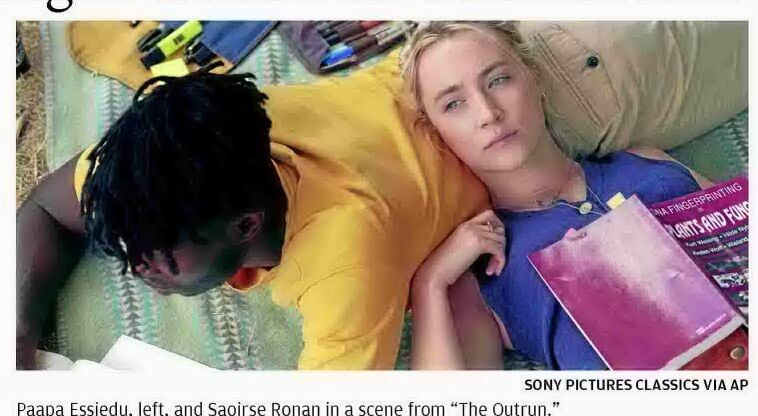
"The Outrun" (R) Grade: A I have a copy of AA's Big Book on the shelf in my office. That book was a graduation gift from Nick, a student I supported during his battle with alcoholism. He was older than average, having left his first college to work for a while as a cook, as I recall.
His journey here was a bumpy ride. He talked like a salty trucker, and tried to hide his drinking. Students, especially women, were wary of him, and backed away.
He came to me and asked for help finding an AA meeting. He joined, and began his slow recovery – two steps forward, one step back. One good day followed another through his last year.
He became almost a foster son to me, coming to my office late every Friday to check in and share stories. We were both hopeful when he graduated. He set out to become a substance abuse counselor, so he could use his own life as inspiration to help others.
He landed a promising job, but wrote to me that he was struggling with familiar demons. One day, years later, I received a call telling me he had died too young. I wasn't told the cause, but I thought of Merle Haggard's song: I'm certain the bottle let him down.
We all have been close to stories like that, I'm sure. Stories of good people battling addiction. There but for the grace of God could go any of us.
We are all vulnerable. Nora Fingscheidt's "The Outrun" is a touching tale of Rona, an intelligent, attractive young woman who holds a graduate degree in biology from a London university. She's a researcher, who loves to study nature.
She's particularly drawn to ocean shores like those where she grew up near Orkney, Scotland. Rona was raised on land overlooking the ocean. Her dad, who is bipolar, tends sheep.
No matter whether dad is high or low, Rona remains lovingly close. During her childhood, she remembers dad opening the window during storms, welcoming the wind that blew so strong no canvas sail could withstand its force. Dad would hold daughter close, seemingly assuring her they would grow stronger by leaning into the wind.
Rona was a brilliant scientist by day, wild dancer by night. We know how she lost her research job: We've watched her being helped up after a barroom fall, and being walked home by a friend. Unable to sustain her career, she leaves London for her rural land near Orkney, Scotland.
But wherever she goes, there she is. She has pushed aside attempts to intervene, denying she needs help. "You're all trying to change me, to control me," she screams.
Finally, after scraping bottom, she agrees to join an AA meeting. "I found God," she tells her mom, quietly. "Or rather God found me.
" Mostly, it's one good day after another. When her string is broken, she starts over again – all the while sitting at her dad's side, loving him even while he sleeps away the day. Saoirse Ronan delivers an interior, textured performance as Rona.
Avoiding the cliches that have drowned so many tales of alcoholism, Ronan lets us see the subtle textures inside Rona. We watch her demons and her angels wrestle for her soul. She knows what is best, but it's hard.
"I cannot be happy, sober," she confesses. Rona's love of her parents, long divorced, is genuine. Mom thinks the Bible can save Rona.
Dad hopes she will stay home forever, and care for the sheep. Rona's descent chases away a loving partner, and ushers in loneliness. She holes up on the island of Papay, in a tiny room on the coast, where storms pound the shore.
Recalling her dad's hugs, Rona opens the window and lets the storm in. It's here, alone, where she finally begins to breathe in ocean air that gives her the strength to change the things she can. The title "The Outrun" presumably refers both to the Scottish land and to her fl ight.
The final act hints at calmer seas, but does not promise healing. The story ends where it began: On Scottish coast, where cold winds blow and whitecapped waves crash on the rocks. In the final scene, Rona is heartened when she spots a rare vanishing bird, perhaps back to visit her.
She leans into the wind and rain, and lifts her arm to direct the ocean like a percussion chorus. "All things come from the ocean, and the ocean takes them back," she says to herself. The rain hides her tears, which are part sadness, part exhaustion, part joy.
She raises her arms and hoists her canvas into the fierce wind, and sails on. Brent Northup has been reviewing movies for 48 years in Helena, Seattle and Houston. He is a professor of communication and journalism at Carroll College.
.










